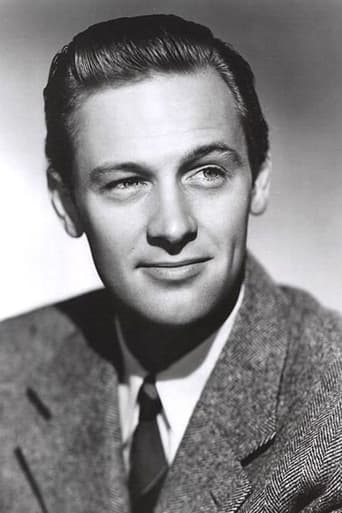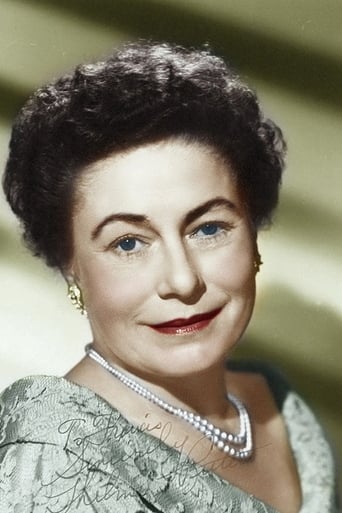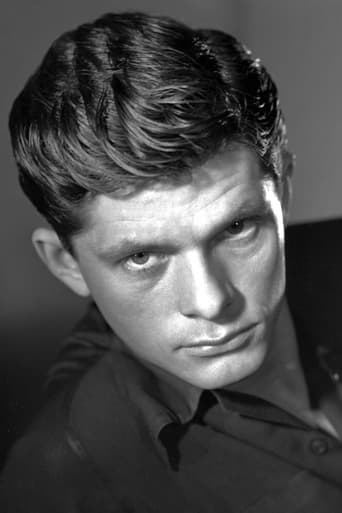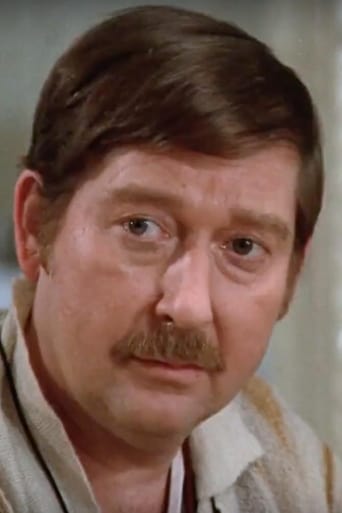Ava-Grace Willis
Story: It's very simple but honestly that is fine.
Mehdi Hoffman
There's a more than satisfactory amount of boom-boom in the movie's trim running time.
Michelle Ridley
The movie is wonderful and true, an act of love in all its contradictions and complexity
Jakoba
True to its essence, the characters remain on the same line and manage to entertain the viewer, each highlighting their own distinctive qualities or touches.
Robert J. Maxwell
There's no question about Deboarah Kerr's beauty. It has an ethereal quality, as if she weren't made of flesh at all but wisps of rose-scented smoke. Her appearance is enhanced by a certain wistful quality. Her voice has a mild but constant tentative tremor, even when she's P'd off.But Noumea and Guadalcanal in 1943 is no place for a girl like this. She's enlisted and comes to Noumea in search of someone who knew the circumstances of her husband's death, killed on Guadalcanal. He was and officer with an elite group of paratroopers in the Marines. (They're never buck privates.) Yet no one seems to remember him. And here she is, at the primitive but combat-free base on Noumea, impelled to greet the wounded debarking from a ship from Guadalcanal. She feels helpless. What can she do -- offer a stick of gum to a soldier who has just had an arm amputated? And at her first encounter with a victim of combat fatigue, she runs off and pukes.The driving force behind Kerr is Thelma Ritter as the seasoned veteran, nurse, guru, mentor, wisecracking New Yorker. Every scene she's in belongs to her.But -- cherchez l'homme. William Holden is some kind of commanding officer with the returning troops. The first shot of him, with military mustache, shows us a stern, frowning, hard charger holding a swagger stick. And we know this is one highly principled and dedicated Marine officer. We know he's tough and has little room for romance. We know, too, that there will be romance anyway because William Holden is a star and so is Deborah Kerr.It helps to know that the story is from a novel by Lucy Herndon Crockett. We can anticipate almost everything that takes place -- the growing attraction, the doubt, the open conflict of sensibilities, the tears, the resolution. Not just because Lucy Herndon Crockett is a woman novelist but because she has three names. And, after all, if the delicate Deborah Kerr could turn into a slut at the first whiff of Burt Lancaster's pheromones three years earlier in "From Here to Eternity", why not do it again? Holden strides purposefully down the gangway and Thelma Ritter stops him, asking "Colonel, is there anything more we can do for your boys." He brusquely replies, "Yes, don't call them boys and leave them alone." Then he marches away without another word.Not for long though. After the usual preliminaries, Kerr finds herself preggers and when she tells Holden, he accidentally knocks her down and the baby is lost. He's disturbed. She's almost destroyed. She won't forgive him. He humbles himself. She forgives him.Not much new here but it's enjoyable to see the stereotypes animated again: horsey, aristocratic, haughty woman; part-Indian slum kid who advances through the Marine stratosphere because of hate. Both of them too full of pride because they've been hurt, but both come together at the end as the love theme swells in the background and the image of Kerr's face, radiant with hope, fades and we see the Paramount Studios mountain.
MartinHafer
"The Proud and Profane" is an annoying war film. That's because to me, the characters (in particular the two leads) come off as phony and unlikable. Together, they form a relationship that is about as believable as a politician making a promise (of any sot).Deborah Kerr plays a very annoying woman. Her husband was killed at Guadalcanal and, inexplicably, she joins the Red Cross and goes to the Pacific to try to find folks who could tell her about her husband. This is hard to believe but when wounded men arrive and she doesn't want to see them because it bothers her to see hurt men, I just wanted to slap her. What an immature and unlikable lady--more like a débutante going to a cotillion than a lady volunteering to help in the war effort.As for William Holden, he plays a tough 'blood and guts' colonel who is VERY intense and selfish. His way of dealing with things is to tell the men to suck it up. Lost an arm? Suck it up. Paralyzed for life? Stop your whining. He even yells at the Chaplin! This guy makes Attila the Hun seem charming.So, you've got too seriously unlikable characters. And, they seem to have absolutely nothing--NOTHING--in common. So, when they suddenly starts kissing and the music wells up with a romantic strain, I felt like throwing a coffee cup at the TV screen. The dialog simply was some of the worst I'd heard of since my last Ed Wood film! The sticky, gooey, and utterly stupid dialog. The worst might be Holden's 'Indian half-breed' speech--but it's all pretty lame.I've noticed that this film has a respectable overall score and decent reviews. Well, I don't get it. Despite top stars, this is a bad film whose only interesting attributes are the bit characters--where you get to see a very young Marion Ross and David Bagdasarian (the guy who created the Chipmunks) in small parts. Otherwise, a complete waste of time.
secondtake
The Proud and Profane (1956)Yes, this movie features William Holden and Deborah Kerr, who do their characteristic best in a lower budget echo of the 1953 blockbuster "From Here to Eternity," also featuring Kerr (but with Lancaster and, for good measure, Montgomery Clift). The comparison is fair, because the similarities are too blatant, and so it's fair to also say that, as ordinary as this movie is, it had potential. There are qualities to the story line that are too moving (wounded soldiers in the Pacific, a widow tracing the last days of her Marine husband's life, a love affair against the rules) and the actors are too fine (add Thelma Ritter as an important third) to just dismiss the whole thing as a mess.The director, George Seaton, is really a screenwriter, and though he directed a dozen features, none of them are especially memorable. His real fame rests on assisting with several great movies (like "The Wizard of Oz") and with a single brilliant coup--the screenplay for the original 1947 as well as the later TV version of "Miracle on 34th St." And it is no surprise that Seaton's own screen writing in "The Proud and Profane," though prosaic, is very good. Ah, but filmmaking is about timing, flow, surprise, drama, light, shadow, and sounds of all kinds. This is the director's blank canvas and Seaton doesn't go anywhere in any of these areas. The light is bright and flat. The camera-work is functional and bland (cameraman John Warren being a newcomer, moving quickly to television, including many Hitchcock episodes). The score is strong (thanks to veteran master Victor Young) but there is no attempt to insert diegetic music or more interesting internal sounds. Even the supporting cast is pigeonholed into clichés (and there is no critical secondary male role, as Clift played in the 1953 movie). Thelma Ritter is at her best, more normalized than in other roles, but believable and superb.I write all this for a routine movie because of Holden, who is an understated and sometimes brilliant actor, and Kerr, who I never warm up to but who is almost designed to be too cold to like. Kerr in particular is up and down here, at times so perfectly cast and so convincing you start to really watch closely, but other times she has to stretch her role a little (when she is dancing, for example, or in the cheesy beach scene early on) and it's awkward. Holden is made to be an enigma, and when he warms up (out of uniform) he's likable, and when he's cold, he's cold, but never admirable, which is what a commander needs to be at least.I enjoyed this movie because I enjoy movies, but also because it has aspects that are terrific. If you really like war films that aren't about battle (as I do), this is a must see. And if you want perspective on "From Here to Eternity" you really will appreciate both films more. For just a fresh, well-made movie, terrific you will need to keep looking.
Robert Ross
Several scenes from "The Proud and the Profane" were shot at my parents' home in St Thomas, USVI, at Estate Frenchman's Bay on the island's southern side. The company bought (and left) an additional refrigerator to make & keep ice for the stars' drinks (it gets hot under the lights in the Caribbean!). I also remember seeing a few huge electric bulbs that apparently were blown out or not worth the expense of shipping back to Hollywood. Since I was in elementary school in the States at the time of shooting, I didn't get to watch any of the production, but heard all the stories when I returned for the summer. "The Frogmen", with Richard Widmark, was also shot on the property (in the bay in front of the house).




